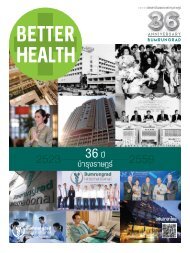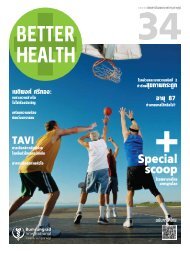Better Health 34 ENG
The magazine for patients and friends of Bumrungrad International Hospital, Thailand.
The magazine for patients and friends of Bumrungrad International Hospital, Thailand.
You also want an ePaper? Increase the reach of your titles
YUMPU automatically turns print PDFs into web optimized ePapers that Google loves.
+++++ Sports Medicine<br />
Preparing your body<br />
for a marathon<br />
14<br />
“ At least one week<br />
before the race, a<br />
participant should<br />
do a practice run.”<br />
Dr. Montinee Sangtian<br />
Marathon running is gaining<br />
popularity worldwide. It’s<br />
now common to see communities<br />
in numerous countries<br />
hold running events, including short<br />
distances of two, three, or five kilometers,<br />
mini-marathons (10.5 km), half<br />
marathons (21 km), and full marathons<br />
(international standardized distance<br />
of 42.195 km). For those wanting a less<br />
intense and competitive experience,<br />
there are also numerous short-distance<br />
walking and running events, often called<br />
“fun runs”.<br />
In this edition of <strong>Better</strong> <strong>Health</strong>, we<br />
talk with Dr. Montinee Sangtian, who<br />
has experience in organizing running<br />
events, which include marathons and<br />
triathlons in the USA. A specialist in<br />
Emergency Medicine, EMS, and holding<br />
a Disaster Medicine Fellowship Certification,<br />
Dr. Montinee reveals how to<br />
get your body ready for the challenges<br />
of running a marathon for the first time.<br />
Why a marathon?<br />
For many runners who have long<br />
trained and achieved personal running<br />
records, completing a full marathon<br />
is the ultimate test. However, this<br />
demanding form of exercise is not<br />
suitable for everyone.<br />
“Marathon running is classified as<br />
an endurance sport, requiring muscular<br />
strength and endurance, as well as a<br />
robust cardiovascular system, where the<br />
runner performs repetitive movements<br />
in the same plane of motion for an<br />
extended period of time,” Dr. Montinee,<br />
says. “Marathon running requires a<br />
high and continuous amount of energy,<br />
which is a clear distinction from shorterdistance<br />
running or sprinting. Athletes<br />
must specially prepare for the unique<br />
rigors of running a marathon.”<br />
Those considering running a<br />
marathon must evaluate their physical<br />
ability before they get to the starting<br />
line. “Some people are careless about<br />
running marathons because they think<br />
that they can stop at any point of<br />
exhaustion, or that they can probably<br />
endure. However, a marathon should<br />
be no different from swimming,<br />
for example, where most people do not<br />
dare participate if they are not sure<br />
that they can make it to the finish line.<br />
In fact, with no physical readiness or<br />
sufficient preparation, running beyond<br />
our physical ability is dangerous<br />
because we may not be aware that we<br />
have exceeded our limit and we risk<br />
having a heart attack.”<br />
Get ready before the race<br />
Physicians recommend that before<br />
you run a marathon, you get a comprehensive<br />
annual health check-up.<br />
Many people do not get these regular<br />
assessments, however, when you intend<br />
to run a race of any distance, you<br />
should at least, initially consult a doctor<br />
to check your physical health and get<br />
specific advice. A check-up ensures<br />
that you have no underlying chronic<br />
disease or other conditions that could<br />
jeopardize your health. These problems<br />
include bone and joint diseases,<br />
hypertension, diabetes, asthma, and<br />
heart disease especially ischemic heart<br />
disease, cardiac arrhythmia and hypertrophic<br />
cardiomyopathy.
















